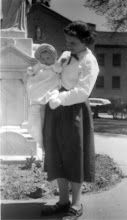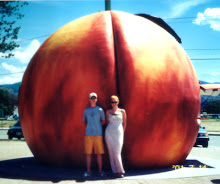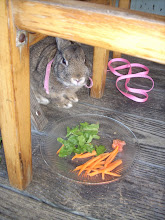
Often times over the course of day to day events Lauren and I are occasionally asked to run errands out and about town. It is often on these random excursions that we begin to question things that we often take for granted about our surroundings. For example the office we work in is just like an explosion of random. There is actual important, professional office equipment that sits sides by side next to a v. realistic looking vulture and portraits of brides from the nineties.
One of whom I am pretty certain is wearing white heeled boots and I judge her a little bit everytime that I have to fax something.
Anyways, we have become comfortably numb to our surroundings and the chaos no longer phases us the way that it does new visitors. Similarly we have become numb to the concept of living in a 'Colonial' area that people actually want to come visit, people actually travel from all over the world to come here. That concept still amazes me. So driving about town today we started to reflect on the significance of the 'pineapple' to colonists and why iT signified hospitality. We began questioning it because pineapples are literally all over town. Like everywhere.
To me personally if someone brought a large, awkward pointy fruit to my house as a gift I would be slightly offended. They are hard to cut, and you can't drink them. Rude.
So why does the pineapple signify hospitality to the rest of the world you might ask? Well the answer is really long and involves alot of history but basically it is because they were rare and valuable and houses that had pineapples had money to entertain and were stylish and welcoming. I mean for a much more historically acurate answer you could google it but if you had thought of this before now you would have done that already so I am guessing you don't really care about the signigicance of the pineapple.
Its fine neither do I, its just one of those questions that I never thought to ask until today. I will say though I do feel better for knowing the answer. Oddly enough despite all of the random stuff in our office, there is no colonial pineapple. I think that we should adopt one. Everyone probably thinks we are not stylish or hospitable which is a total lie. None of us own Vera Bradleys and we are always willing to share our cheese cubes. Actually maybe not willing but I will I suppose.....
if you really wanted one.
Thats it we are getting a pineapple. But not a real one because in this office odds are it would become either an object of mockery or a centerpeice.
So thus begins the quest for the perfect fake pineapple.
Wish me luck :)
One of whom I am pretty certain is wearing white heeled boots and I judge her a little bit everytime that I have to fax something.
Anyways, we have become comfortably numb to our surroundings and the chaos no longer phases us the way that it does new visitors. Similarly we have become numb to the concept of living in a 'Colonial' area that people actually want to come visit, people actually travel from all over the world to come here. That concept still amazes me. So driving about town today we started to reflect on the significance of the 'pineapple' to colonists and why iT signified hospitality. We began questioning it because pineapples are literally all over town. Like everywhere.
To me personally if someone brought a large, awkward pointy fruit to my house as a gift I would be slightly offended. They are hard to cut, and you can't drink them. Rude.
So why does the pineapple signify hospitality to the rest of the world you might ask? Well the answer is really long and involves alot of history but basically it is because they were rare and valuable and houses that had pineapples had money to entertain and were stylish and welcoming. I mean for a much more historically acurate answer you could google it but if you had thought of this before now you would have done that already so I am guessing you don't really care about the signigicance of the pineapple.
Its fine neither do I, its just one of those questions that I never thought to ask until today. I will say though I do feel better for knowing the answer. Oddly enough despite all of the random stuff in our office, there is no colonial pineapple. I think that we should adopt one. Everyone probably thinks we are not stylish or hospitable which is a total lie. None of us own Vera Bradleys and we are always willing to share our cheese cubes. Actually maybe not willing but I will I suppose.....
if you really wanted one.
Thats it we are getting a pineapple. But not a real one because in this office odds are it would become either an object of mockery or a centerpeice.
So thus begins the quest for the perfect fake pineapple.
Wish me luck :)





























































According to an article in "Colonial Williamsburg: Journal of CW Foundation" (Winter 2008, p. 69), the pineapple as a symbol of hospitality in colonial America is a myth. The article notes that the first pineapple-as-hospitality symbol occurs in a 1935 book about Hawaii. Following classical models, colonists adopted the pinecone for decoration as a symbol of fertility & regeneration. The pinecone is also a classical motif for winemaking-- CW article: http://www.history.org/Foundation/journal/
ReplyDeleteWinter08/stuff.cfm.
Does pineapple "hospitality" or pinecone "aspiration" ring most true as an 18th century symbol? Colonial Williamsburg as impresario of 18th century taste promotes the gracious hospitality of the pineapple motif in modern decorations & "shoppes."
It's laudable that CW Foundation fearlessly publishes:
... the pineapple would have been
a (rare) treat on any colonial
table. But there is no evidence
that anyone at the time thought
of the fruit as a symbol of
hospitality.